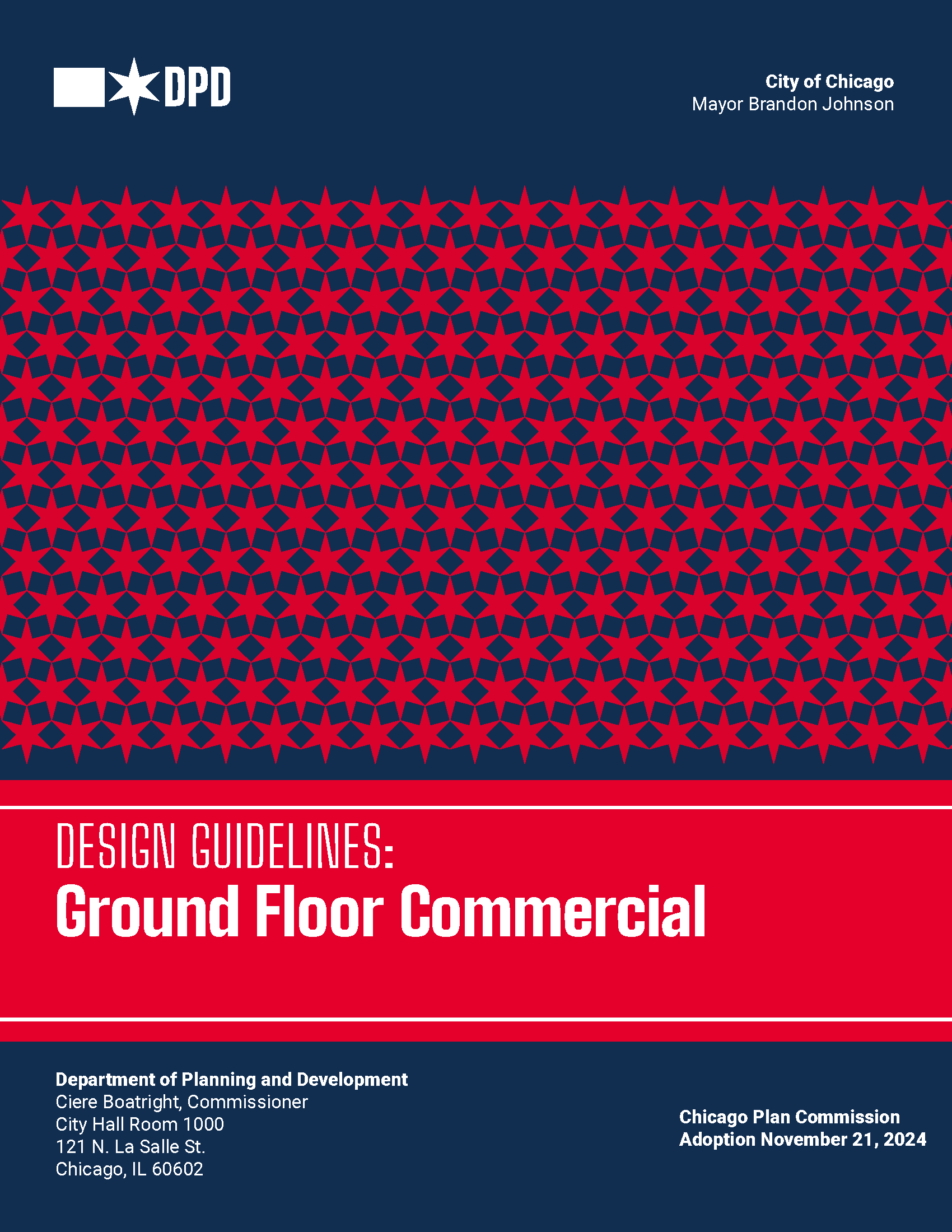Design Excellence
|
The Department of Planning and Development (DPD) is engaged in a number of efforts to formalize the City’s commitment to a high-quality built environment that celebrates and enhances Chicago’s unique architectural and urban design legacy. To launch this initiative, DPD engaged a Design Excellence Working Group to answer the question: How do we engender a culture that values design excellence in everyday life?From this question, several thematic principles emerged that collectively aspire to achieve design excellence for Chicago residents, businesses and other local stakeholders. These include:
|
Neighborhood Design GuidelinesDeveloped by DPD and adopted by Plan Commission in March 2022, the Neighborhood Design Guidelines provide specific recommendations to enhance the planning, review and impact of development along the city’s commercial corridors. As a complement to other City design resources and regulations, the guidelines are adaptable to the unique context of individual neighborhoods, corridors and blocks. The guidelines are organized across six categories:
|
Neighborhood Design Guidelines
|
The guidelines are intended to be used for all public and private projects located along Chicago’s commercial corridors. Projects that require the City’s review and oversight should substantially correspond to their parameters, especially Planned Developments, Lakefront Protection Ordinance projects, and projects that receive City grants, funding or other incentives.
DPD is seeking feedback from property owners, developers, designers and community members to continue to refine the guidelines’ scope and content. Comments may be directed to DPD@cityofchicago.org.
Design Guidelines: Ground Floor Residential on Commercial CorridorsDeveloped by DPD and adopted by Plan Commission in March 2024, these design guidelines were created to provide best practices and inspiration for ground floor housing along Chicago’s neighborhood commercial corridors. The intent is to support livable ground floor housing units, complement existing commercial corridors and promote renewed vibrancy in the hearts of Chicago’s neighborhoods. This guidelines document does not modify any land uses, policies, project review processes or ordinances. Projects must comply with current regulations, which include the Chicago Zoning Ordinance, Construction Codes and applicable review processes. These guidelines are a resource for any ground floor housing, including the renovation of existing buildings and new construction on commercial corridors. They build upon Chicago’s adopted Neighborhood Design Guidelines, which provide high level urban design guidance that is flexible enough to apply in any Chicago neighborhood. This document contains best practices and design inspiration specific to ground floor housing, which has unique challenges in an urban context. DPD is seeking feedback from property owners, developers, designers and community members to continue to refine the guidelines’ scope and content. Comments may be directed to DPD@cityofchicago.org. |
Design Guidelines: Ground Floor Residential on Commercial Corridors
|
Design Guidelines: Ground Floor CommercialDeveloped by DPD and adopted by Plan Commission in November 2024, the Ground Floor Commercial Design Guidelines provide specific recommendations and best practice examples for future design review of renovation and new construction ground floor commercial project proposals along Chicago’s commercial corridors. The purpose of these guidelines is to create a set of user-friendly and best practice examples for non-design professionals, including small business owners and small property owners. The Ground Floor Commercial Design Guidelines build off the previously adopted Neighborhood Design Guidelines and the Ground Floor Residential on Commercial Corridors Design Guidelines. These design guidelines are meant to be a resource and clarify best practices; they are not taking policy positions, changing ordinances or imposing additional requirements or processes. Projects that require the City’s review and oversight should substantially correspond to their parameters, especially projects that receive City grants, funding or other incentives. DPD is seeking feedback from elected officials, property owners, developers, designers, and community members to continue to refine the guidelines’ scope and content. Comments may be directed to DPD@cityofchicago.org. |
|




